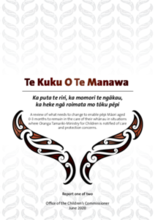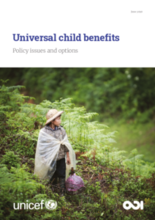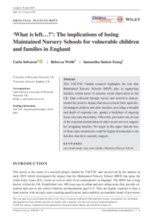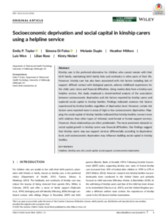Displaying 121 - 130 of 505
The Children’s Commissioner of New Zealand undertook a thematic review of the policies, processes and practices of Oranga Tamariki Ministry for Children relating to care and protection issues for pēpi Māori (Māori infants) aged 0-3 months. This first report presents the insights gained from interviews with mums and whānau (family) who had experience with pēpi (aged 0-3 months) who had either been removed, or were at risk of being removed, from their whānau by Oranga Tamariki or its predecessor Child, Youth and Family.
This report from ODI and UNICEF critically reviews the case for universal child benefits (UCBs). It seeks to contribute to a burgeoning and lively debate on the (potential) role of UCBs as a policy instrument in the pursuit of child poverty reduction and universal social protection.
This TACTYC funded research highlights the role that Maintained Nursery Schools (MNS) play in supporting families within areas of extreme social deprivation in the UK.
This paper examines the frequency with which transition-age foster youth receive asset building services and whether the youth who receive services experience improved outcomes compared to those who do not.
This article argues that the current system of care in most jurisdictions forces foster youth to be financially and socially independent at an earlier age, despite insufficient preparation, and notes that healthcare providers can be important advocates for youth in care by championing their medical and psychological needs and serving as a bridge that lasts beyond foster care.
This dashboard draws on periodic country office reporting against an evolving questionnaire, first initiated on 12 March 2020, representing important early indications of the impacts of COVID-19 on the disruption of essential services for children and families.
Using routine data from a kinship care helpline service, this study employed a mixed‐method analysis of the association between socioeconomic deprivation and risk factors reported by kinship carers in the UK and explored social capital in kinship families.
This study explored the parenting experiences of orphaned youth heading households in resource-constrainted environments.
This study sought to determine the needs of the general population of children in Botswana.
The authors of this study draw on the decision-making ecology model of judgement and decision making in child protection to speculate on possible causes of false positive errors in decision making regarding the removal of Aboriginal and Torres Strait Islander children from their families.






